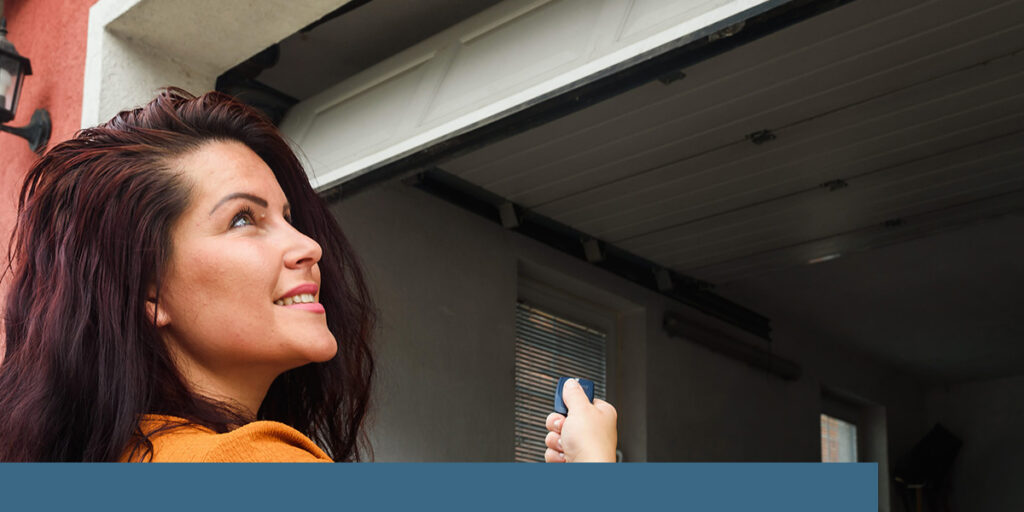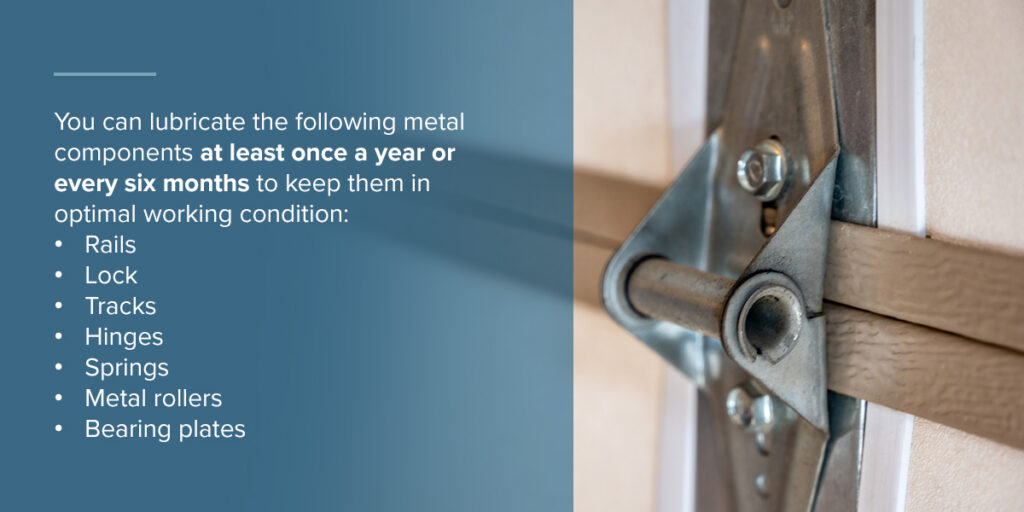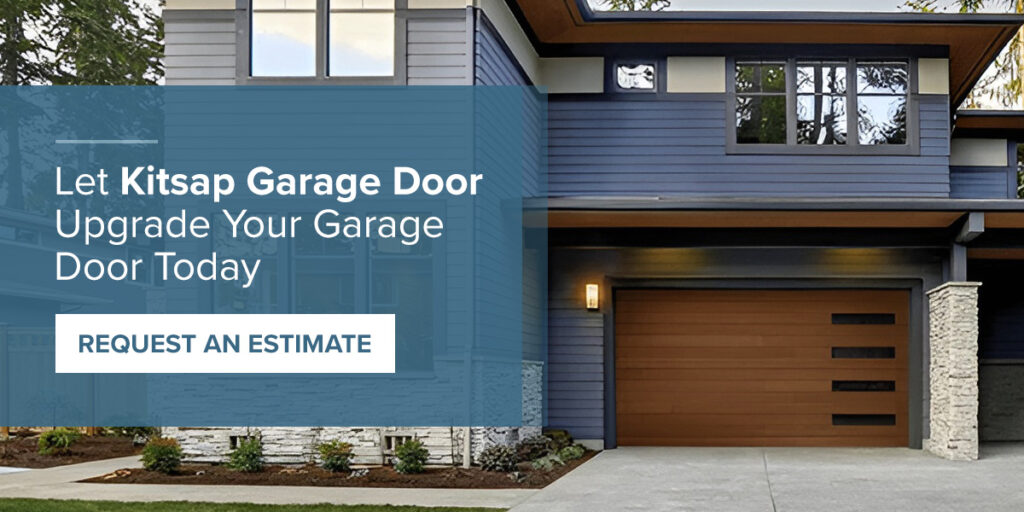
A noisy garage door is frowned upon by neighbors, passers-by and household members alike. Fortunately, you can do several things to quiet your garage door. Learn how to make your garage door quieter and when to call in a professional to keep everyone safe and happy.
Reasons for a Noisy Garage Door
A garage door could be unusually noisy for several reasons, most of which are easily identified. Different sounds have different sources. For example, banging could mean the door has come off track. A popping sound could indicate that the springs snapped.
Here are a few common reasons your garage door might be noisy:
- Worn rollers: The rollers keep the door in its tracks, but they wear out over time. With worn rollers, you may experience a screeching sound paired with loud vibrations.
- Snapped springs: The torsion or extension springs may have snapped, causing a loud popping sound. The door will likely lag or struggle to open without the springs.
- Improperly installed garage door: A door that wasn’t properly installed by the previous technician may be imbalanced, so when it opens it makes a noise.
- An off-balance door: You may notice the door looks uneven when it opens — if it opens at all. Additionally, if it takes longer to open, it might be off-balance. The reason for this could be snapped springs, a broken drive system, overbearing door weight or damage caused by a car knock.
DIY Garage Door Noise Reduction Tips
Depending on the source and severity of the noise, you can do a few things to resolve the issue. Sometimes, the cause is something small you can take care of yourself. In other instances, it’s best to let professionals handle it. Here are a few ways you can reduce your garage door noise:
Insulate the Garage Door
If your garage door isn’t already insulated, adding insulation can be an effective solution to reducing noise. The main purpose of insulating your door is to help it resist heat transfer to better regulate the temperature in the garage, staying warm in winter and cool in summer. However, insulation can also reduce vibrations and help block sound.
The R-value represents the heat resistance when the door is insulated. By increasing the R-value, the insulation helps reduce noise. It might seem like thicker insulation would block sound better, but this isn’t necessarily the case.
Installing foam panels can be a good option — these panels aren’t too thick and repel noise well. You can find kits to add insulation yourself, but seeking help from a reputable garage door company to do the job professionally may be easier. If your garage door is old and needs many repairs, consider replacing it with a new insulated door.
Lubricate Metal Garage Door Components
The garage door has many moving metal parts that assist in the door’s daily operation. These metal parts need to be lubricated regularly to ensure they don’t stick and interfere with the door’s operation. If you choose to lubricate the various parts yourself, avoid using household lubricants or oil that’s not suitable for these parts. A lithium-based oil that’s safe for garage doors is more effective.

You can lubricate the following metal components at least once a year or every six months to keep them in optimal working condition:
- Rails
- Lock
- Tracks
- Hinges
- Springs
- Metal rollers
- Bearing plates
Tighten All the Screws, Bolts and Nuts
A rattling sound could indicate loose screws and nuts. This gradually happens as the door opens and closes. When the door is closed, inspect it from inside and see if you can find any loose screws, bolts or nuts. Assess how loose or tight they are by gently wiggling the parts and tightening them accordingly.
The door should operate smoothly and quietly once everything is tightened. If you still hear noises, another problem is the cause. Contact a garage door professional if you notice any other issues that might be causing the noise to continue.
When to Contact Professionals for Garage Door Noise Reduction
You’ll sometimes need professionals to help with your garage door noise reduction. Only experienced technicians should handle parts that are heavy or dangerous to operate. Here are instances when you should call experts for assistance:
Replacing the Springs
The springs help balance a garage door’s weight so it can function efficiently. They work by winding up when the door closes and unwinding when it opens, ensuring there’s enough power to lift it. When the springs are damaged or snapped, you can hear squeaking noises each time the door is in use.
Two types of springs are used:
- Torsion springs: Located above the garage door, torsion springs work wind and unwind to allow the tension to turn the cables around the drums.
- Extension springs: These are found on both garage door sides and work differently. Pulleys counterbalance the cables so the springs release tension when the door is opened.
Springs under tension are incredibly dangerous. It’s safest for a professional to handle spring replacement.
Reinstalling a Garage Door
If the door isn’t installed properly, it may be imbalanced on one side, making a scraping noise as it opens and closes. The best solution is for a garage door technician to assess the state of your garage door and determine whether a reinstallation is required.
Upgrading Your Garage Door Opener
Garage door openers vary in noise based on their model. A chain-driven opener is louder than a belt-driven one due to the metal-on-metal friction of the chain. A garage door professional can advise you on the best opener for your specific needs.
Installing a Garage Door Silencer
Even if your garage door opener is a quieter model, you may still hear noise from vibration when it’s in use, especially if your house has a room over the garage. Installing a garage door silencer above the opener can reduce the low humming vibration sound. This product separates the opener from the ceiling, significantly reducing the vibrations and noise. DIY options are available, but it’s safest to consult an expert.
Performing an Annual Tune-Up Service
An annual tune-up service is a preventive measure that can identify issues before they worsen. This comprehensive service includes checking the springs and cables and ensuring all parts are tightened, lubricated and secure, amongst other things. If there are noise concerns, technicians will locate and resolve the issue. The service covers an array of areas you may be able to address yourself, but you’ll have peace of mind knowing they’ve been resolved by service professionals.
Let Kitsap Garage Door Upgrade Your Garage Door Today
Kitsap Garage Door is the solution to getting a quiet garage door. We have the experience and knowledge to handle any garage door problem so you don’t have to. We have a large selection of garage doors suited for every home style and unique preferences.
Call us at (360) 692-0849 or request an estimate today!


